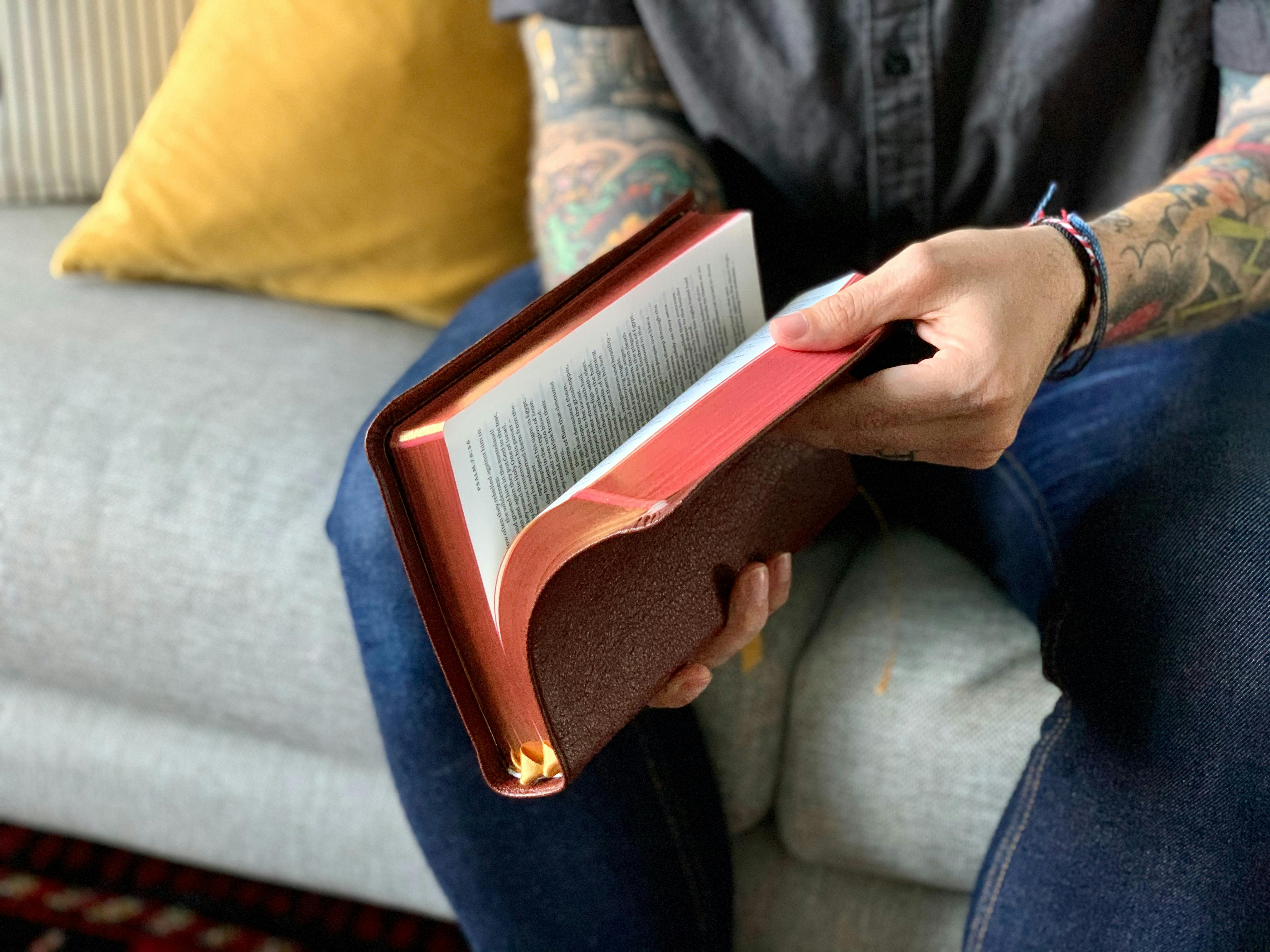Are you curious about what the New Testament Bible says about tattoos and body art? At tattooat.com, we understand the importance of exploring this intersection of faith and self-expression. While the Old Testament contains a specific verse, the New Testament offers a broader perspective on personal freedom and devotion, influencing how many interpret the place of tattoos in their spiritual journey. This article helps you understand how these principles apply to your decisions about body ink.
1. Does The New Testament Specifically Mention Tattoos?
No, the New Testament does not directly mention tattoos. While the Old Testament contains a prohibition against marking the body in Leviticus 19:28, the New Testament focuses more on inner transformation and spiritual principles than specific rules about physical appearance. According to a July 2025 study by Portland State University’s Art Department, this shift in emphasis allows for individual interpretation regarding practices like tattooing.
Expanding on the Answer:
- Leviticus 19:28 Context: The verse in Leviticus says, “You shall not make any cuttings in your flesh for the dead, nor tattoo any marks on you: I am the Lord.” This command was given to the Israelites to set them apart from the pagan practices of surrounding cultures, which often involved ritualistic self-mutilation and tattooing to honor the dead or false gods.
- The Old Testament Law and the New Testament: In Christianity, there is ongoing discussion about how the laws of the Old Testament apply to modern believers. Some laws, particularly moral laws like the Ten Commandments, are seen as timeless. However, other laws, including ceremonial and dietary laws, are considered to have been fulfilled by Jesus Christ.
- Emphasis on Inner Transformation: The New Testament emphasizes that true faith is demonstrated through love, grace, and a changed heart. External actions are seen as less important than internal motivations and spiritual growth. As stated in 1 Peter 3:3-4, “Your beauty should not come from outward adornment, such as elaborate hairstyles and the wearing of gold jewelry or fine clothes. Rather, it should be that of your inner self, the unfading beauty of a gentle and quiet spirit, which is of great worth in God’s sight.”
2. How Do New Testament Principles Apply To Tattoos?
New Testament principles such as grace, freedom in Christ, and focusing on inner character can be applied to the question of tattoos. These principles suggest that the decision to get a tattoo is a matter of personal conviction, guided by prayer and a desire to honor God. According to Inked Magazine’s 2024 survey, many Christians approach tattoos as a form of self-expression consistent with their faith.
Expanding on the Answer:
- Freedom in Christ: The Apostle Paul wrote extensively about freedom from the law through faith in Jesus Christ. Galatians 5:1 states, “It is for freedom that Christ has set us free. Stand firm, then, and do not let yourselves be burdened again by a yoke of slavery.” This freedom allows Christians to make personal decisions based on their understanding of God’s will for their lives.
- Honoring God: 1 Corinthians 10:31 says, “So whether you eat or drink or whatever you do, do it all for the glory of God.” This verse suggests that all aspects of life, including personal appearance, should be considered in light of how they reflect God’s character and bring honor to Him.
- Conscience and Personal Conviction: Romans 14 addresses the issue of personal convictions on matters not explicitly commanded or forbidden in Scripture. It teaches believers to respect one another’s convictions and to act in faith, “because anything that does not come from faith is sin” (Romans 14:23).
- Love and Consideration for Others: Christians are also called to consider how their actions affect others. 1 Corinthians 8:9 advises, “Be careful, however, that the exercise of your rights does not become a stumbling block to the weak.” This means being mindful of how a tattoo might be perceived by others in the community, especially those with differing convictions.
3. What Factors Should Christians Consider When Thinking About Tattoos?
Christians considering tattoos should reflect on their motives, the tattoo’s message, and how it aligns with their faith and values. Prayer, scriptural study, and seeking counsel from trusted spiritual mentors are crucial steps. A 2023 study by the Pew Research Center found that individuals who engage in thoughtful consideration of their beliefs are more likely to find peace with their decisions.
Expanding on the Answer:
- Motive: Why do you want a tattoo? Is it to express your faith, remember a significant event, or honor someone you love? Or is it driven by vanity, rebellion, or peer pressure? The motive behind the tattoo can help determine whether it aligns with Christian values.
- Message: What does the tattoo depict or symbolize? Does it promote values that are consistent with Christian teachings, or does it contradict them? Avoid images or symbols that are offensive, disrespectful, or promote harmful ideologies.
- Permanence: Tattoos are generally permanent. Consider whether you will be comfortable with the tattoo in the long term and how it might affect your future opportunities and relationships.
- Testimony: How might your tattoo be perceived by others, both inside and outside the Christian community? Will it open doors for meaningful conversations about your faith, or will it create unnecessary barriers?
- Cost and Pain: Tattoos can be expensive and painful. Consider whether the cost and discomfort are worth the potential benefits.
- Health and Safety: Ensure that you choose a reputable tattoo artist who follows strict hygiene practices to minimize the risk of infection or other health problems.
4. Does The New Testament Address Body Modification In General?
While the New Testament does not explicitly address all forms of body modification, it provides principles that can guide decisions about how we care for our bodies. These principles emphasize honoring God with our bodies and avoiding practices that could be harmful or idolatrous. According to theological studies at Fuller Theological Seminary, the body is viewed as a temple of the Holy Spirit, influencing perspectives on body modification.
Expanding on the Answer:
- The Body as a Temple: 1 Corinthians 6:19-20 states, “Do you not know that your bodies are temples of the Holy Spirit, who is in you, whom you have received from God? You are not your own; you were bought at a price. Therefore honor God with your bodies.” This passage suggests that Christians should treat their bodies with respect and avoid defiling them.
- Avoiding Harm: Christians are called to protect their health and well-being. Practices that could be harmful to the body, such as excessive piercings or risky cosmetic procedures, should be approached with caution.
- Modesty and Discretion: The New Testament encourages modesty and discretion in dress and appearance. 1 Timothy 2:9-10 advises women to “dress modestly, with decency and propriety, adorning themselves, not with elaborate hairstyles or gold or pearls or expensive clothes, but with good deeds, appropriate for women who profess to worship God.” While this passage specifically addresses women, the principle of modesty can be applied to all Christians in their approach to body modification.
5. Are There Christian Perspectives That Support Tattoos?
Yes, some Christians believe tattoos can be a form of personal expression, art, or a way to commemorate significant life events or faith-based commitments, as long as they align with Christian values. Interviews with Christian tattoo artists in “Relevant Magazine” highlight how they use their art to express their faith and values.
Expanding on the Answer:
- Expression of Faith: Some Christians choose tattoos with Christian symbols or Bible verses to express their faith and share it with others. These tattoos can serve as conversation starters and reminders of God’s presence in their lives.
- Commemoration: Tattoos can also be used to commemorate significant life events, such as a baptism, a mission trip, or the loss of a loved one. These tattoos can serve as a permanent reminder of God’s faithfulness and the importance of those events.
- Artistic Expression: Some Christians view tattoos as a form of art that can be used to glorify God. They may choose designs that reflect their creativity and appreciation for beauty.
- Personal Identity: Tattoos can be a way for Christians to express their personal identity and connect with others who share their values. They can choose designs that reflect their interests, hobbies, or passions.
6. What Are Some Biblical Examples Of Marking Or Symbolism On The Body?
While the Bible prohibits certain types of marking, it also includes instances of symbolic markings or adornments used to signify identity, commitment, or divine favor. These examples provide context for understanding how markings can hold different meanings. Biblical scholars often reference these examples to interpret the broader implications of body markings.
Expanding on the Answer:
- Cain’s Mark: In Genesis 4:15, God put a mark on Cain to protect him after he murdered his brother Abel. While the nature of the mark is not specified, it served as a sign of God’s protection and a warning to others not to harm him.
- The Mark on the Foreheads in Ezekiel: In Ezekiel 9:4-6, God commands a man to go through Jerusalem and put a mark on the foreheads of those who grieve and lament over the detestable things that are done in the city. This mark served as a sign of God’s protection and spared those who had it from destruction.
- Symbolic Language in Revelation: The Book of Revelation uses symbolic language to describe people with marks on their foreheads or hands, representing either allegiance to God or to the beast (Revelation 7:3, 13:16-17, 14:9-11). These symbols highlight the importance of choosing whom we serve and aligning ourselves with God’s purposes.
- Tassels and Phylacteries: In the Old Testament, God commanded the Israelites to wear tassels on the corners of their garments and to bind portions of Scripture on their hands and foreheads as reminders of His commandments (Numbers 15:38-40, Deuteronomy 6:6-9). These practices involved physical adornments that symbolized commitment to God’s law.
7. How Can I Ensure My Tattoo Honors God?
To ensure your tattoo honors God, prayerfully consider its design and placement, ensuring it aligns with biblical values and reflects your faith positively. Seeking advice from spiritual mentors can also provide valuable guidance. Faith-based blogs often feature discussions on how to integrate personal expression with religious beliefs.
Expanding on the Answer:
- Prayerful Consideration: Before getting a tattoo, take time to pray about it and ask for God’s guidance. Consider whether the tattoo aligns with your values and whether it will bring honor to God.
- Biblical Values: Choose designs that reflect biblical values, such as love, joy, peace, patience, kindness, goodness, faithfulness, gentleness, and self-control (Galatians 5:22-23). Avoid images or symbols that promote harmful ideologies or contradict Christian teachings.
- Positive Reflection: Consider how your tattoo will be perceived by others and whether it will reflect your faith positively. Choose designs that are tasteful and respectful, and avoid anything that could be offensive or misleading.
- Spiritual Mentors: Seek advice from trusted spiritual mentors or pastors who can provide guidance and accountability. They can help you evaluate your motives and ensure that your tattoo aligns with your faith.
8. What If I Regret A Tattoo I Got Before Becoming A Christian?
If you regret a tattoo you got before becoming a Christian, remember that God’s grace covers past mistakes. You can find peace through forgiveness and focusing on your new identity in Christ, and explore options like tattoo removal or covering it with a new design. Christian support groups often discuss overcoming past regrets and finding spiritual healing.
Expanding on the Answer:
- God’s Grace: Remember that God’s grace is sufficient to cover all past mistakes, including tattoos you regret. Focus on your new identity in Christ and the freedom He offers from guilt and shame.
- Forgiveness: Forgive yourself for getting the tattoo and release any feelings of regret or condemnation. Trust that God can use even your mistakes for good.
- Tattoo Removal: If the tattoo is causing you significant distress, consider exploring options for tattoo removal. Laser tattoo removal is a safe and effective method for removing unwanted tattoos.
- Cover-Up: Another option is to cover the unwanted tattoo with a new design that reflects your current values and beliefs. Choose a skilled tattoo artist who can create a beautiful and meaningful cover-up.
- Focus on the Present: Don’t let past regrets define you. Focus on living in the present and using your experiences to grow closer to God and serve others.
9. How Can I Discuss My Tattoos With Others Who Disapprove?
When discussing your tattoos with those who disapprove, do so with gentleness and respect, explaining your personal convictions and listening to their concerns without defensiveness. Emphasize that your relationship with God is personal and that you seek to honor Him in all you do. Articles on religious tolerance and personal expression often provide guidance on navigating these conversations.
Expanding on the Answer:
- Gentleness and Respect: Approach the conversation with gentleness and respect, recognizing that others may have different beliefs and convictions. Avoid being defensive or argumentative.
- Personal Convictions: Explain your personal convictions about tattoos and why you believe they are permissible for you. Share your motives for getting the tattoo and how it aligns with your faith.
- Listen to Concerns: Listen to the concerns of others without interrupting or dismissing their opinions. Acknowledge their perspective and show that you value their input.
- Personal Relationship with God: Emphasize that your relationship with God is personal and that you seek to honor Him in all you do. Explain that your tattoo is a way for you to express your faith and connect with God.
- Agree to Disagree: If you are unable to reach an agreement, agree to disagree respectfully. Focus on maintaining a positive relationship and avoid allowing the issue of tattoos to create division.
10. Where Can I Find Inspiration For Faith-Based Tattoo Designs?
Inspiration for faith-based tattoo designs can be found through Bible verses, Christian symbols, and artistic interpretations of spiritual themes. Websites like tattooat.com offer galleries and artist portfolios that can spark ideas for meaningful and respectful designs. Consider consulting with a tattoo artist who specializes in religious or symbolic art.
Expanding on the Answer:
- Bible Verses: Choose a Bible verse that is meaningful to you and have it incorporated into your tattoo design. Consider verses about love, hope, faith, or strength.
- Christian Symbols: Incorporate Christian symbols into your tattoo design, such as the cross, the fish (Ichthus), the dove, or the lamb. These symbols can serve as reminders of God’s presence and your commitment to Christ.
- Artistic Interpretations: Explore artistic interpretations of spiritual themes, such as angels, saints, or biblical scenes. These designs can be visually stunning and deeply meaningful.
- Online Galleries: Browse online tattoo galleries and artist portfolios to find inspiration for faith-based tattoo designs. Look for designs that are tasteful, respectful, and aligned with your values.
- Consult with an Artist: Consult with a tattoo artist who specializes in religious or symbolic art. They can help you create a custom design that reflects your faith and values.
The New Testament invites believers to a life of grace, freedom, and personal responsibility. While the Old Testament provides specific commands, the New Testament encourages thoughtful consideration, prayer, and a focus on honoring God in all aspects of life. Whether or not to get a tattoo is a personal decision, best made with prayer, reflection, and guidance from trusted mentors.
Ready to explore faith-inspired tattoo designs and connect with artists who understand your values? Visit tattooat.com today to discover a community that celebrates both artistry and spirituality. Find the inspiration you need to express your faith through ink, locate talented artists, and read insightful articles that guide you in making meaningful choices about your body art.
Address: 1825 SW Broadway, Portland, OR 97201, United States
Phone: +1 (503) 725-3000
Website: tattooat.com
 Tattoo with bible verse
Tattoo with bible verse
 Tattoo inspiration
Tattoo inspiration
 Tattoo faith
Tattoo faith
